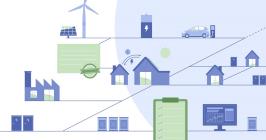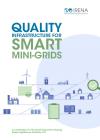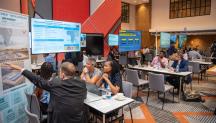

-
-
IRENA (2020), Quality Infrastructure for Smart Mini-grids, International Renewable Energy Agency, Abu Dhabi.
Copied
/-/media/Files/IRENA/Agency/Publication/2020/Dec/IRENA_Smart_mini-grids_outlook_2020.pdf
Copied
Quality infrastructure for smart mini-grids
Newsletter
Mini-grids are complex systems dependent on different suppliers and used in different applications, often with high regulatory uncertainty over their installation and operation. Creating a viable market for renewable-based mini-grids, with prospects of growth and long-term profitability for investors, depends on establishing trustworthy quality infrastructure (QI) for the technologies and systems involved.
This report from the International Renewable Energy Agency (IRENA) highlights the crucial role of QI for the development of smart renewable mini-grids. Grid-connected mini-grids can increase power system resilience and reliability, while facilitating the integration of solar and wind power. Renewable mini-grids far off the main grid, meanwhile, can provide reliable electricity access for remote areas and islands.
Among other findings:
- Comprehensive standards, testing, certification and accreditation, along with ongoing monitoring and metrology, reduce risks in mini-grid development. Effective QI improves project financing, reduces legal, regulatory and performance uncertainty, strengthens mini-grid markets and helps to cut electricity costs.
- Global installed capacity exceeds 4 gigawatts (GW) for off-grid renewable mini-grids, mainly using bioenergy for industrial purposes. Hydropower mini-grids are growing for communities and industries, while solar photovoltaic (PV) mini-grid installations support commercial, community and agricultural uses.
- The core uses for renewable mini-grids are power generation, energy storage, conversion and consumption, along with control, manage and measure (CMM) applications. Internet of things (IoT) platforms will form the backbone of future CMM functionality, with innovations in storage technology enhancing mini-grid applications.
- Inadequate QI can result in failed investments, lost electricity production, and damage to national market reputations. Mini-grid market development goes hand in hand with QI development.
- System-level testing presents a major challenge for renewable mini-grid development. More flexible and cost-effective testing methods based on widely standardised models can reduce risk perceptions associated with mini-grids, given their intrinsically local, sometimes isolated, nature.
- A gradual approach is needed to integrate QI into policy frameworks, ensuring that real-world renewable energy policies reflect the constant evolution of mini-grids. Experience with solar PV growth highlights the value of national and international QI.




